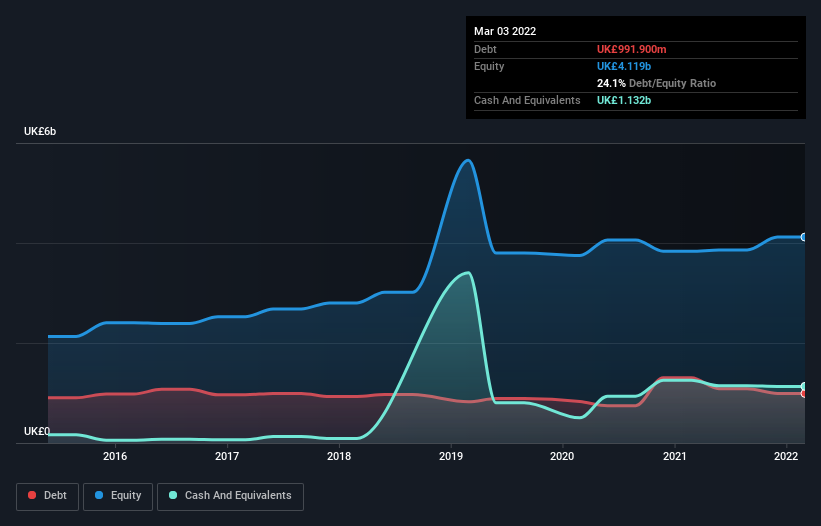Is Whitbread (LON:WTB) Using Too Much Debt?
Some say volatility, rather than debt, is the best way to think about risk as an investor, but Warren Buffett famously said that 'Volatility is far from synonymous with risk.' It's only natural to consider a company's balance sheet when you examine how risky it is, since debt is often involved when a business collapses. Importantly, Whitbread plc (LON:WTB) does carry debt. But should shareholders be worried about its use of debt?
When Is Debt A Problem?
Generally speaking, debt only becomes a real problem when a company can't easily pay it off, either by raising capital or with its own cash flow. Ultimately, if the company can't fulfill its legal obligations to repay debt, shareholders could walk away with nothing. While that is not too common, we often do see indebted companies permanently diluting shareholders because lenders force them to raise capital at a distressed price. Of course, the upside of debt is that it often represents cheap capital, especially when it replaces dilution in a company with the ability to reinvest at high rates of return. The first thing to do when considering how much debt a business uses is to look at its cash and debt together.
See our latest analysis for Whitbread
What Is Whitbread's Debt?
You can click the graphic below for the historical numbers, but it shows that Whitbread had UK£991.9m of debt in March 2022, down from UK£1.30b, one year before. However, its balance sheet shows it holds UK£1.13b in cash, so it actually has UK£140.5m net cash.
How Healthy Is Whitbread's Balance Sheet?
Zooming in on the latest balance sheet data, we can see that Whitbread had liabilities of UK£719.6m due within 12 months and liabilities of UK£4.73b due beyond that. Offsetting these obligations, it had cash of UK£1.13b as well as receivables valued at UK£92.2m due within 12 months. So it has liabilities totalling UK£4.22b more than its cash and near-term receivables, combined.
This is a mountain of leverage relative to its market capitalization of UK£5.24b. Should its lenders demand that it shore up the balance sheet, shareholders would likely face severe dilution. While it does have liabilities worth noting, Whitbread also has more cash than debt, so we're pretty confident it can manage its debt safely.
We also note that Whitbread improved its EBIT from a last year's loss to a positive UK£83m. The balance sheet is clearly the area to focus on when you are analysing debt. But ultimately the future profitability of the business will decide if Whitbread can strengthen its balance sheet over time. So if you're focused on the future you can check out this free report showing analyst profit forecasts.
Finally, a company can only pay off debt with cold hard cash, not accounting profits. While Whitbread has net cash on its balance sheet, it's still worth taking a look at its ability to convert earnings before interest and tax (EBIT) to free cash flow, to help us understand how quickly it is building (or eroding) that cash balance. Happily for any shareholders, Whitbread actually produced more free cash flow than EBIT over the last year. There's nothing better than incoming cash when it comes to staying in your lenders' good graces.
Summing up
Although Whitbread's balance sheet isn't particularly strong, due to the total liabilities, it is clearly positive to see that it has net cash of UK£140.5m. And it impressed us with free cash flow of UK£287m, being 344% of its EBIT. So we don't have any problem with Whitbread's use of debt. There's no doubt that we learn most about debt from the balance sheet. However, not all investment risk resides within the balance sheet - far from it. Case in point: We've spotted 1 warning sign for Whitbread you should be aware of.
If, after all that, you're more interested in a fast growing company with a rock-solid balance sheet, then check out our list of net cash growth stocks without delay.
Have feedback on this article? Concerned about the content? Get in touch with us directly. Alternatively, email editorial-team (at) simplywallst.com.
This article by Simply Wall St is general in nature. We provide commentary based on historical data and analyst forecasts only using an unbiased methodology and our articles are not intended to be financial advice. It does not constitute a recommendation to buy or sell any stock, and does not take account of your objectives, or your financial situation. We aim to bring you long-term focused analysis driven by fundamental data. Note that our analysis may not factor in the latest price-sensitive company announcements or qualitative material. Simply Wall St has no position in any stocks mentioned.

 Yahoo Finance
Yahoo Finance 
